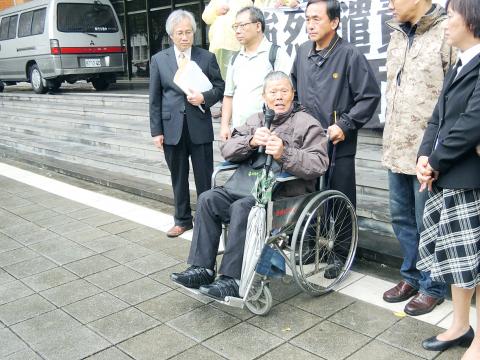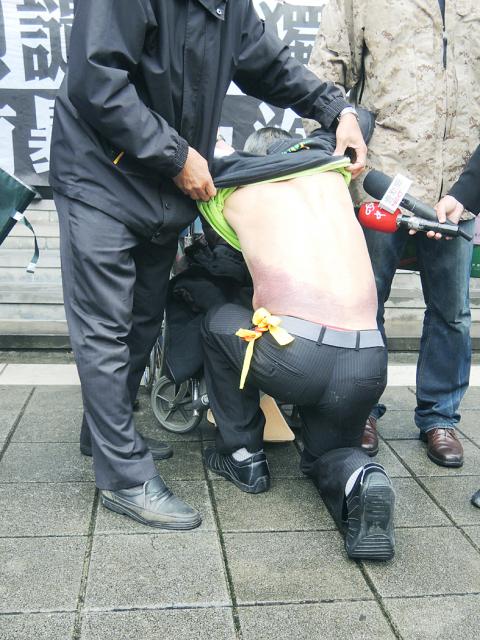Pro-independence activist Chou Jung-tsung (周榮宗), 76, died from cirrhosis on Saturday, two days before the one-year anniversary of the March 23 Executive Yuan occupation last year.
Chou, a long-term supporter of Taiwanese independence and social movements, participated in the Sunflower movement protests in March and early April last year, in which tens of thousands of protesters laid siege to the Legislative Yuan compound and surrounding streets to voice their opposition to a proposed trade pact with China.
Chou received fractured ribs and an abdominal hemorrhage after then-premier Jiang Yi-huah (江宜樺) ordered officers to remove protesters from the Executive Yuan early on March 24.

Photo: Chang Wen-chuan, Taipei Times
At a news conference on March 31 last year, Chou said he was beaten with batons in the compound by police officers and then blasted with a water cannon while he lay on the street.
Aided by human rights groups, Chou filed a private prosecution on charges of attempted murder against Jiang, President Ma Ying-jeou (馬英九), former National Police Agency director Wang Cho-chun (王卓鈞) and former Taipei Zhongzheng First Police Precinct Chief Fang Yang-ning (方仰寧).
A Facebook post by the pro-independence group Taiwan Referendum Alliance said that Chou learned about his condition after he received medical attention for his injuries.

Photo: Chang Wen-chuan, Taipei Times
“When the March 18 [Sunflower] movement erupted, [Chou] defended Taiwan defiantly with his flesh and bones to protect students who were screaming and howling throughout the night,” the post said.
A photograph of Chou sitting on the pavement while being sprayed with water cannons was on display at an open-air photography exhibition outside the Legislative Yuan, which ended last night.

The manufacture of the remaining 28 M1A2T Abrams tanks Taiwan purchased from the US has recently been completed, and they are expected to be delivered within the next one to two months, a source said yesterday. The Ministry of National Defense is arranging cargo ships to transport the tanks to Taiwan as soon as possible, said the source, who is familiar with the matter. The estimated arrival time ranges from late this month to early next month, the source said. The 28 Abrams tanks make up the third and final batch of a total of 108 tanks, valued at about NT$40.5 billion

Two Taiwanese prosecutors were questioned by Chinese security personnel at their hotel during a trip to China’s Henan Province this month, the Mainland Affairs Council (MAC) said yesterday. The officers had personal information on the prosecutors, including “when they were assigned to their posts, their work locations and job titles,” MAC Deputy Minister and spokesman Liang Wen-chieh (梁文傑) said. On top of asking about their agencies and positions, the officers also questioned the prosecutors about the Cross-Strait Joint Crime-Fighting and Judicial Mutual Assistance Agreement, a pact that serves as the framework for Taiwan-China cooperation on combating crime and providing judicial assistance, Liang

A group from the Taiwanese Designers in Australia association yesterday represented Taiwan at the Midsumma Pride March in Melbourne. The march, held in the St. Kilda suburb, is the city’s largest LGBTQIA+ parade and the flagship event of the annual Midsumma Festival. It attracted more than 45,000 spectators who supported the 400 groups and 10,000 marchers that participated this year, the association said. Taiwanese Designers said they organized a team to march for Taiwan this year, joining politicians, government agencies, professionals and community organizations in showing support for LGBTQIA+ people and diverse communities. As the first country in Asia to legalize same-sex

MOTIVES QUESTIONED The PLA considers Xi’s policies toward Taiwan to be driven by personal considerations rather than military assessment, the Epoch Times reports Chinese President Xi Jinping’s (習近平) latest purge of the Chinese People’s Liberation Army (PLA) leadership might have been prompted by the military’s opposition to plans of invading Taiwan, the Epoch Times said. The Chinese military opposes waging war against Taiwan by a large consensus, putting it at odds with Xi’s vision, the Falun Gong-affiliated daily said in a report on Thursday, citing anonymous sources with insight into the PLA’s inner workings. The opposition is not the opinion of a few generals, but a widely shared view among the PLA cadre, the Epoch Times cited them as saying. “Chinese forces know full well that